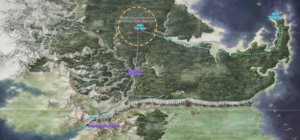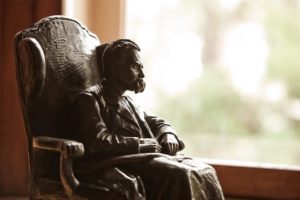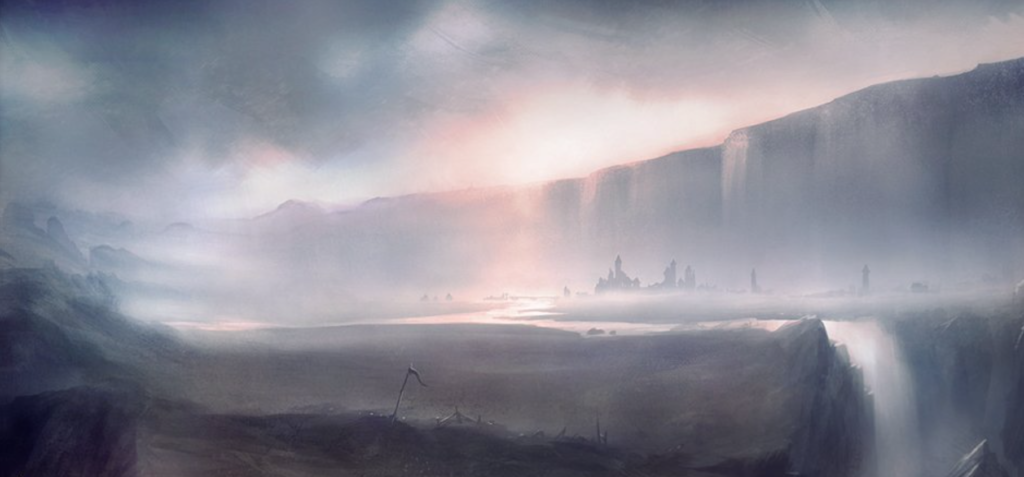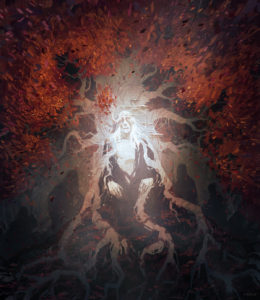‘Christian ethics was like a time bomb ticking away in Europe, a Trojan horse waiting for its season’. —William Pierce
‘1945 was the year of the total inversion of Aryan values into Christian values’. —Joseph Walsh
This is The West’s Darkest Hour in a nutshell!
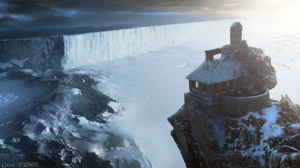
In George Martin’s fantasy novels, the Wall is an immense wall of ice stretching from east to west in the north of Westeros, separating the Seven Kingdoms from the wilds beyond.
It is considered one of the nine wonders created by man, but my appropriation of some characters from the A Song of Ice and Fire universe would upset the anti-Nazi George Martin. In my appropriation, the Wall symbolises the white man’s mental block due to Christian morality.
First migration
We could start our journey of deprogramming such morality in the direction of the Wall by reading carefully Thomas Goodrich’s Hellstorm: The Death of Nazi Germany, 1944-1947.
I discovered Goodrich’s book thanks to a white nationalist webzine. I approached the Wall in 2010 and began to devise ways to cross it. Psychologically, it is very difficult to approach the Wall, even if you stay in the comfort zone, the south side, the fertile ground. Due to Christian morality, the white man considers it disloyal to worry about a real holocaust that, at the hands of the Allies, the Germans of the last century suffered, including women and children, the subject of Hellstorm: the greatest secret in modern history.
A book review of Tom’s book can be read in the webzine Counter-Currents, here. This review is the starting point of our journey; without taking this first step it will be impossible for the adventurer to reach our destination.
How many have approached the Wall, even if they remain on the south side, educated in white nationalist forums such as American Renaissance or The Occidental Observer? Quite a few, it seems, according to their comments section and other less serious nationalist sites.
Second migration
It is one thing to believe in the sacred words of David Lane, and another to cross the immense Ice Wall. This can be done via a tunnel under it, while white nationalists have decided to stay in the comfort zone. By contrast, the National Socialists of the last century dared to cross the Wall to populate the northern side.
Although Adolf Hitler was their guiding star, in his book for the masses of Protestant and Catholic Germans, Mein Kampf, he wasn’t entirely outspoken insofar as it is not an anti-Christian manifesto. The second migration, going under the tunnel, requires the reading of a more frank text: Hitler’s Table Talk (our translation of the introduction to the German edition can be read here). I would also suggest the book of Hitler’s priestess Savitri Devi, who, after the catastrophe of 1945, came to grasp the spirit of Hitlerism perfectly. See my excerpts of Brendan Simms’s Hitler and my abridged Memoirs and Reflections of an Aryan Woman, linked in the list below the swastikas of this article (the full text in French can be read here; the complete translation into Spanish, here).
Taking all this into consideration, who has crossed the tunnel? That is, who, among the white nationalists, has been disappointed by this stagnation south of the Wall and converted, like Savitri, to Hitler’s religion? Since it is forbidden in totalitarian Europe to speak out in favour of National Socialism, it is impossible to calculate the figure in the Old World. And as far as the country of the First Amendment is concerned, I am afraid to say that the neo-Nazis got stuck in the tunnel.
Who, among them, crossed it in the sense of transvaluing Christian values to pre-Christian values (cf. The Fair Race’s Darkest Hour also linked below)? More specifically, who maintains that the extermination of races that stand in the way of an Aryan Reich is a moral enterprise given the new scale of values? What they do is the opposite: many of these Christians and neochristian secular humanists have become holocaust deniers when what we need are holocaust affirmers who follow in the footsteps of Mark Weber, the head of the Institute for Historical Review, even if Weber isn’t exactly a priest of the holy words.[1]
He who has transvalued his values endorses not only Heydrich’s Wannseekonferenz but also Himmler’s Generalplan Ost or General Plan East: a secret Nazi plan of ethnic cleansing, the aim of which was to deport more than thirty million Untermenschen from the western parts of the Soviet Union to Siberia. The plan, prepared during the years 1939-1940, was part of Hitler’s dream of expanding the German Lebensraum[2] to create, with the help of his loyal SS, a beautiful Eastern and Western Europe populated by Nordics: a utopia such as I have, since December 1978, dreamed with Parrish’s paintings.

So, I repeat: Who has recently crossed the tunnel, who has turned to Hitler’s faith without atavisms of Christian morality? I guess they could be counted on the fingers of one hand, and perhaps some of them have even commented on this site.
Third migration
It is one thing to cross the Wall—an axiological metamorphosis in which the Christian compass of ‘good’ and ‘evil’ is replaced by Heydrich- and Himmler-like Hitlerism—and another to meet the three-eyed raven.
Even on the other side of the wall, Hitlerism’s top ideologues were still talking about ‘God’, or that the historical Jesus might have had Aryan blood. Hitler himself believed the story that Mary could have been impregnated by a Roman soldier with Gallic blood. Never mind that Hitler wasn’t a Christian but a pantheist (see the PDF listed below, our excerpts from Hitler’s Religion), or that this semi-Aryan Jesus was, in his imagination, a mere mortal. The very fact that, in speaking of deity, he and other top National Socialists continued to use the singular ‘God’ implied, for the German mass imagery, a monotheistic entity: a late tail of Judaeo-Christianity.
When speaking about the deity, an entirely transvalued overman already uses the word ‘Gods’, in the plural, like those of the Delphic Oracle, and even ‘god’ with lowercase when alluding to the despicable god of the Hebrews. Similarly, to believe that a semi-Aryan Jesus confronted the Temple Jews is itself a residue of kike programming because it suggests that this historical Jesus might have been benign to our cause. The reality is that it was the Jews themselves who wrote the so-called New Testament and invented that literary character. (See what David Skrbina says in Neo-Christianity, also linked below: one of our most important PDFs for understanding the West’s darkest hour. And even more important is what Tom Holland says in that very same PDF.)
In Martin’s novel, after crossing the Wall Bran Stark and his guardians find guides who lead them to the cave of the three-eyed raven (actually a human telepath), who offers to train Bran in retrocognition and out-of-body experiences: the last ‘greenseer’ who can, paranormally, see the past as it happened. Anyone who has seen the past by studying Richard Carrier’s On the Historicity of Jesus: Why We Might Have Reason for Doubt knows that Jesus was a character of pure literary fiction, probably from the pen of rabbis (watch a conference by Carrier here).
What is infinitely worse, in our collective unconscious (I was raised Catholic) the Jesus archetype has inverted Indo-European values to the values of the subversive Jews who wrote the gospel. See the long essay by a Spaniard on Rome and Judea in The Fair Race (sample page: here) and pay special attention to the quotations from Nietzsche.
Had Hitler won the war, his spiritual descendants wouldn’t have stayed so close to the Wall, though already firmly settled on the northern side. One among them would have followed the long and arduous path that Bran travelled inland until he reached the mysterious cave of the raven. That, and that alone, would have represented the final initiation of the adventurer who migrated from the warm lands south of Westeros. He had come to the Wall to—unlike the stagnant Southerners—cross it to seek and find the last of the greenseers and be initiated into the ancient religion that existed before the arrival of those who destroyed the sacred trees.
How many National Socialists have been initiated in the raven’s cave to the extent that they have retrocognitively ‘scanned’ not only the career of Judea’s governor Pontius Pilate (with the crow’s third eye it was possible to see that even a human, all too human Jesus was missing from the historical record), but also what the Judaeo-Christians did throughout the Roman Empire: destroy the classical world (see also Deschner’s books, linked below)? How many have become ultimate apostates of Christianity, cutting off the tail end of the last atavisms of semi-apostasy (e.g., Alfred Rosenberg’s views of an Aryan Jesus)? How many have knelt before their true Gods, begging for forgiveness for having committed the mortal sin of worshipping the god of their enemies for two thousand years? How many are legitimate heirs, like Savitri, of the religion bequeathed to us by the avatar of Vishnu?
______ 卐 ______
 Below, the PDF books of our Daybreak Press in the order in which they were published. When more funds come in, or more sponsors want to support this site, they will be available in print again:
Below, the PDF books of our Daybreak Press in the order in which they were published. When more funds come in, or more sponsors want to support this site, they will be available in print again:
Day of Wrath (May 20, 2014 / Revised July 2020)
The Fair Race’s Darkest Hour (May 2014 / Revised July 2023)
Daybreak (September 2020 / Revised November 2022)
On Exterminationism (December 2020 / Revised March 2023)
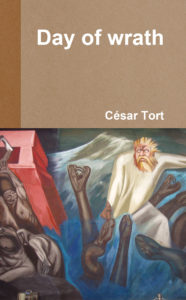 On Beth’s Cute Tits (June 2021 / Revised August 2022)
On Beth’s Cute Tits (June 2021 / Revised August 2022)
Memoirs and Reflections of an Aryan Woman (11 July 2023)
Books related to the Christian problem
Excerpts from Hitler’s Religion by Richard Weikart
Christianity’s Criminal History Vol I
Christianity’s Criminal History Vol II
Neo-Christianity
Essays on the Christian problem
Alain de Benoist: ‘Christianity: The communism of antiquity’
Hans Günther: ‘The dissolution of Germanic racial care by medieval Christianity’
Revilo Oliver: ‘Christianity: A religion for sheep’
César Tort: Crusade against the Cross: The tragic life of Nietzsche
Texts on the U.S. problem
Several authors: American Racialism
On the author of this website (Metapedia article here)
How was it that from the age of seventeen, in 1976, I embarked on such an anti-Christian journey and now what I most long for is my day of wrath? The autobiographical Letter to mom Medusa (Revised English translation: August 2022) is the only one of our books that isn’t available in PDF, but a hard copy still can be obtained here. My other autobiographical books are also available in print, although they haven’t yet been translated into English: a task that I will continue this very year.
___________________
[1] The historian Mark Weber, the director of the Institute for Historical Review, now accepts that a few homicidal gassings happened in some death camps and is basically on the same page as historian David Irving. See Irving’s views on the Jewish holocaust here. See also Weber’s interview with a denier, Jim Rizoli. After minute 52 Weber speaks of the gassings; after 1:08 he says that between 2 and 4 million Jews died, although not necessarily murdered by the Germans but died in the ghettos from diseases, unhealthy conditions, etc.
[2] Lebensraum is a German concept of expansionism and Völkisch nationalism, whose philosophy and policies were common to German politics from the 1890s to the 1940s (see On Exterminationism, linked above, pages 117-129).
